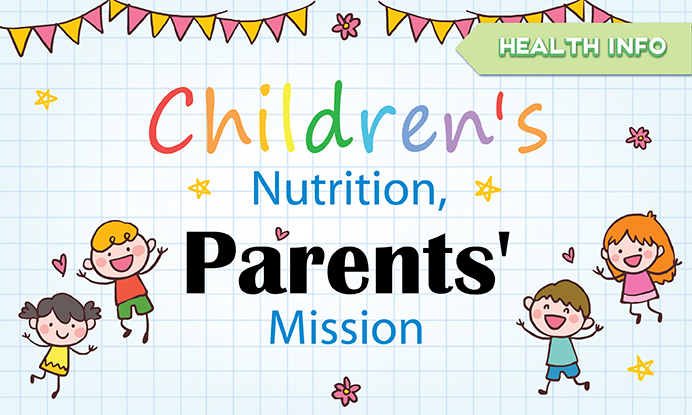- Home
- Health Center
- Health Info
- Children’s Nutrition, Parents’ Mission
Immunity
Children’s Nutrition, Parents’ Mission


1. Is your child a picky eater?
a. A growing child should be on a balance diet. A lack of a balance diet may result in a lack of vitamins and nutrients for a growing child.1
b. If your child is a picky eater – get a multivitamin which covers the recommended nutrient intake of vitamin A, C, D, Iron and Calcium.2
2. Consider the specific needs of your child.
a. Cognitive development for a head start
- Docosahexaneoic acid (DHA) is associated with brain development. It is increasingly recognised in having a positive effect in brain development during childhood.3
- DHA supplements are available in chewable formulation and are also found in most milk formulas.
b. Physical growth for the late bloomers
- Protein is required for the development of cells and muscles, it is therefore vital for physical growth of a child.4
- Proteins are commonly available in milk formulation.
- If your child is lactose intolerant, one can consider plant based protein such as pea protein or soy protein formulations.
- Calcium and vitamin D are needed for bone development, thereby aids in physical growth of children.4
- Calcium supplements are available in chewable tablets.
c. Immune system for a child that always catches the flu
- Vitamin C, colostrum, probiotics, probiotic metabolites, lactoferrin and black elderberry extract are a few examples of supplements that can boost child’s immune system.5
- These supplements are available in syrup, chewable tablets, powder sachet and liquid formulations.
d. Tummy problems
- Probiotics are mainly known to improve digestive issues.
- There are some studies stating probiotics are effective for constipation, diarrhea, colic and the immune system.6
- Probiotics for children are generally available in powder form. Most products can be mixed in water or juice before consumption.
3. Is the dosage appropriate for his/her age?
a. Always follow the dosage instructions at the label. You can also always check with the pharmacist.
b. A few general examples of the Recommended Nutrient Intake (RNI)7 for the following supplements based on a child’s age:
- Protein
- Ø 1-3 years: 12g/day
- Ø 4-6 years : 16g/day
- Ø 7-9 years: 23g/day
- Calcium
- Ø 1-3 years: 700mg/day
- Ø 4-9 years: 1000mg/day
- Iron (10% bioavailability)
- Ø 1-6 years: 6mg/day
- Ø 7-9 years: 9mg/day
- Vitamin A
- Ø 1-3 years: 400 mcg/day
- Ø 4-6 years: 450 mcg/day
- Ø 7-9 years: 500 mcg/day
- Vitamin C
- Ø 1-6 years: 30mg/day
- Ø 7-9 years: 35mg/day
- Vitamin D
- Ø 1-9 years: 15mcg/day
- EPA + DHA intake
- Ø 2-4 years: 150mg
- Ø 4-6 years: 200mg
- Ø 6-10 years: 300mg
4. “Parenting tips” when handing your child a supplement.1
a. Keep the vitamins away from children so that they don’t treat them like candy.
b. Some parents promise a dessert treatto their children in order to finish his/her meal. Try treating with a chewable supplement instead.
c. Pills are hard to swallow, try giving supplements to your child in the form of liquid or chewable supplements.
d. Some supplements may interact with certain medication. Always ask your child’s doctor or pharmacist to check for drug interactions if your child is on medication.
References
- Malaysian food pyramid. Nutrition society of Malaysia. (Web accessed January 2019). Web link: http://nsm.nutritionmonthmalaysia.org.my/dietary-guidelines/
- Vitamins for Kids: Do Healthy Kids Need Supplements? WebMD (Web accessed January 2019). Web link: https://www.webmd.com/parenting/guide/vitamins-for-kids-do-healthy-kids-need-vitamins#1
- DHA effects in brain development and function. L Lauritzen, P Brambilla, A Mazz, et al. (2016) Nutrients MDPI.
- Recommended nutrient intakes for Malaysia. National coordinating committee on food and nutrition. (2017) Ministry of Health Malaysia.
- 6 Supplements to boost your child’s immune system. J Ng. Caring Pharmacy Health Information. (Web accessed January 2019). Web link: http://www.caring2u.com/health-center-health-information-inner.php?id=77
- Probiotics: The Friendly Bacteria. Nancy Gottesman (2018). Parents Magazine. (Web accessed January 2019). Web link: https://www.parents.com/toddlers-preschoolers/feeding/healthy-eating/probiotics-the-friendly-bacteria/
- Recommended nutrient intakes for Malaysia. National coordinating committee on food and nutrition (2017). Ministry of Health Malaysia.
Latest Health Info
Brave the Cold: Winter Travel Needs
Winter travel has its kind of magic — snow-covered landscapes, cozy lodges, hot drinks, and festive markets. But traveling in ...
Beat the Heat When Travelling
Whether you’re on a scenic beach vacation or exploring a busy city, hot weather can quickly wear you out and ...
Got Pins & Needles? Learning about Diabetic Neuropathy
Diabetic neuropathy is a common yet serious complication of diabetes, estimated to affect up to 50% of people with the ...



